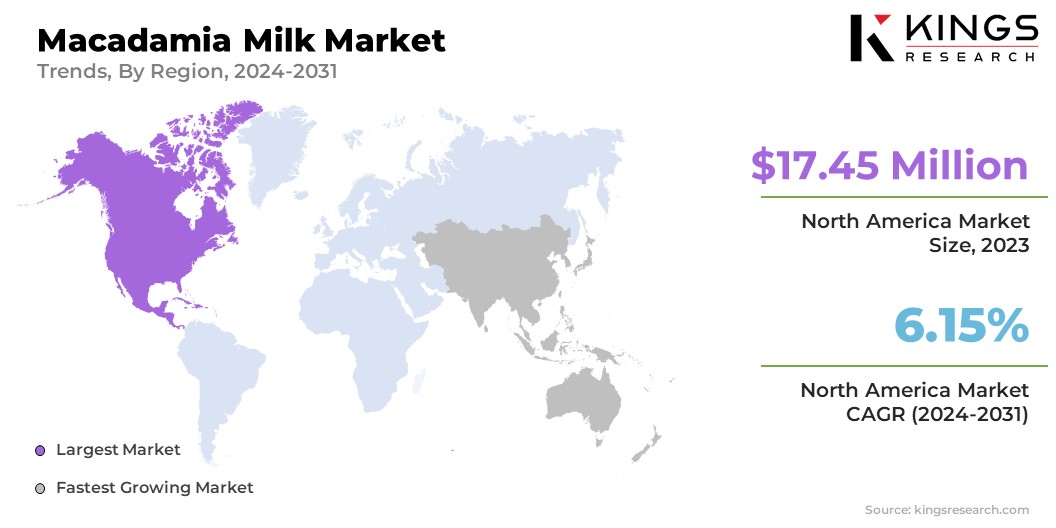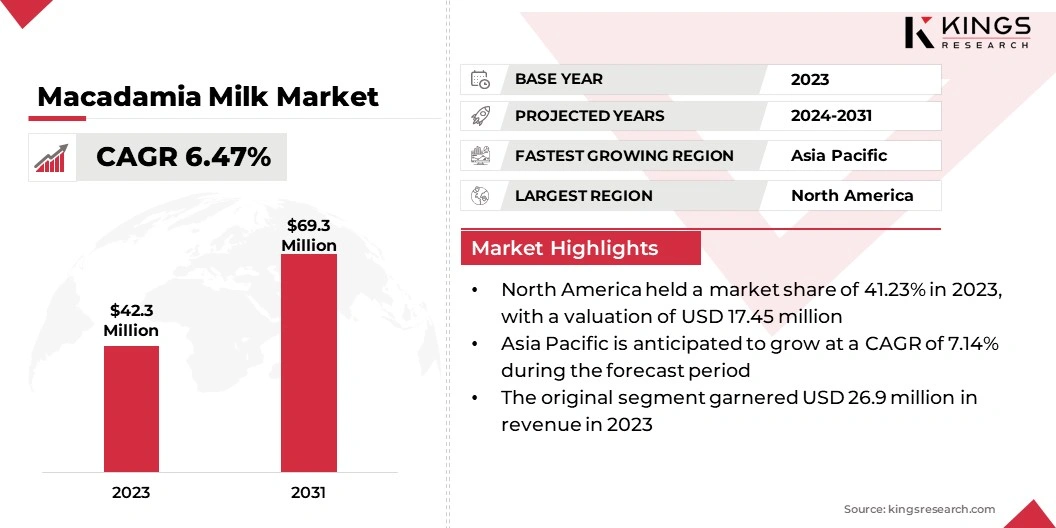Food and Beverages

Macadamia Milk Market

Macadamia Milk Market Size, Share, Growth & Industry Analysis, By Type (Original, Sweetened), By Nature (Organic, Conventional), By Sales Channel (Hypermarket/Supermarket, Specialty Store & Others), and Regional Analysis, 2024-2031
Pages : 120
Base Year : 2023
Release : September 2024
Report ID: KR1045
Macadamia Milk Market Size
The global Macadamia Milk Market size was valued at USD 42.3 million in 2023 and is projected to grow from USD 44.7 million in 2024 to USD 69.3 million by 2031, exhibiting a CAGR of 6.47% during the forecast period. The global shift toward plant-based diets is a significant factor bolstering the growth of the market.
As consumers become more aware of the environmental and ethical implications of dairy consumption, they are increasingly turning to plant-based alternatives. Macadamia milk, known for its rich, creamy texture, has emerged as a popular premium option in the non-dairy milk segment.
The surging popularity of veganism, coupled with the rising adoption of flexitarian diets, is further boosting this demand, as more people seek to reduce their dairy intake without compromising taste or texture.
In the scope of work, the report includes products offered by companies such as Milkadamia, Marquis Macadamias, Kikkoman Corporation, Plant Baby (Kiki Milk), Giraf Limited, Noumi Limited, Patons Group, Nam Viet F&B., Macamilk, Omello, and others.
The growing emphasis on health and wellness is another crucial factor propelling the expansion of the macadamia milk market. Consumers are actively seeking nutritious and functional foods that support a healthy lifestyle. Macadamia milk, renowned for its high content of heart-healthy monounsaturated fats and low in carbohydrates, is particularly appealing to health-conscious consumers. It also provides essential vitamins and minerals, making it an attractive option for those looking to enhance their diet with nutrient-dense alternatives.
Macadamia milk is a plant-based, non-dairy milk alternative, made from macadamia nuts. It is produced by blending macadamia nuts with water, followed by straining the mixture to remove the solids, which result in a smooth, creamy liquid. Macadamia milk is known for its rich, buttery flavor and silky texture, making it a popular choice among those seeking a luxurious alternative to traditional dairy milk.
It is often fortified with vitamins and minerals, such as calcium and vitamin D, to enhance its nutritional profile. Macadamia milk is naturally low in carbohydrates and sugar, while being rich in healthy monounsaturated fats, which are beneficial for heart health. Due to its creamy consistency, it is often used in coffee, smoothies, baking, and cooking. Additionally, macadamia milk is suitable for those who are lactose intolerant, vegan, or allergic to soy and other nuts.
Analyst’s Review
Companies in the macadamia milk market are fostering growth through product innovations and strategic partnerships, thereby setting new benchmarks for dairy alternatives in an increasingly competitive landscape. These companies are actively developing new formulations and flavors of macadamia milk, in response to the rising demand for plant-based dairy alternatives that offer both health benefits and appealing taste .
By continuously enhancing their product offerings, businesses are maintaining a competitive edge by aligning with consumer trends and expanding their market share.
- For instance, in June 2024, Milkadamia launched its first USDA organic macadamia milk product, named Organic Artisan. This new addition deliver the brand’s signature smooth taste and creamy texture while offering the convenience of ready-to-drink, homemade nut milk.
Additionally, partnerships between macadamia milk producers and food and beverage companies are contributing significantly to market expansion. These collaborations enable the integration of macadamia milk into a wider range of products, ranging from coffee beverages to baked goods, thereby increasing its visibility and consumption across different consumer segments. By leveraging these partnerships, companies are broadening their distribution channels and enhancing their brand presence in the market.
- For instance, in December 2023, Milkadamia partnered up with Pop Up Grocer to introduce four varieties of its popular beverages to the grocery store. Additionally, the Barista selectio is likely to be featured at the in-store café, providing a richer and creamier flavor for lattes and cappuccinos
Moreover, companies are investing heavily in sustainable sourcing and production practices, reflecting the growing consumer preference for environmentally friendly products. This focus on sustainability differentiates them from competitors and contributes to long-term market growth by appealing to the eco-conscious consumer.
Macadamia Milk Market Growth Factors
The rising popularity of veganism and vegetarianism is a significant factor contributing to the growth of the market. As more consumers adopt plant-based diets for ethical, environmental, or health reasons, the demand for non-dairy milk alternatives has surged.
Macadamia milk, with its rich, creamy texture and nutritional benefits, has emerged as a popular choice among vegans and vegetarians who seek dairy-free options. This shift is more than a passing trend and signifies a substantial lifestyle change as consumers increasingly prioritize products that align with their personal values and dietary preferences.
- As reported by Worldmetrics.org in 2024, 67% of the global populationfollows plant-based diets. In the past three years, veganism in the US has surged by 600%, with 79% of Americans opting for plant-based options.
Moreover, the functional food and beverage market, which includes products that offer additional health benefits beyond basic nutrition, is growing rapidly. Macadamia milk, often fortified with vitamins, minerals, and other functional ingredients, aligns well with this category.
Consumers looking for beverages that align with specific health goals, such as promoting improved digestion, strengthening bone health, or enhancing cognitive function, are increasingly turning to fortified plant-based milks such as macadamia milk.
Additionally, the rising cases of lactose intolerance and allergies associated with soy, hazelnut, and almond milk are significantly augmenting the growth of the market. As awareness of lactose intolerance increases and individuals seek alternatives to traditional dairy products, macadamia milk emerges as a suitable option due to its natural lactose-free properties.
Additionally, consumers with sensitivities to soy, hazelnut, and almond milk are increasingly turning to macadamia milk as a hypoallergenic and nutritious alternative. This shift is contributing to the expansion of the market, catering to a growing demographic that seek safe and inclusive dairy alternatives.
- According to Intermountain Health, about 70% of the global population experiences lactose intolerance as of June 2023. This condition affects between 75% and 95% of individuals within African American and Asian communities.
However, the macadamia milk market faces strong competition from well-established plant-based milk options such as almond, soy, and oat milk, which have already security significant consumer loyalty. This competition may limit market growth by making it challenging for macadamia milk to differentiate itself and capture a larger market share. To overcome this challenge, companies are investing heavily in innovative product formulations. This includes the development of unique flavors, fortified options, and blends incorporating additional nutritious ingredients.
Moreover, they are focusing on targeted marketing campaigns that highlight the distinct health benefits and superior taste of macadamia milk. These efforts are contributing to a stronger brand presence and attracting consumers seeking new and premium plant-based alternatives, thereby driving market growth.
Macadamia Milk Market Trends
The expansion of the food and beverage industry, coupled with the growing versatility of macadamia milk in various culinary applications, is supporting the expansion of the market. As the food and beverage industry advances and diversifies, there is an increasing demand for unique and high-quality ingredients that cater to evolving consumer preferences.
Macadamia milk has become a sought-after ingredient in this sector, particularly in specialty coffee shops, restaurants, and health-focused food brands, where its rich texture and flavor are highly valued. The ability of macadamia milk to froth and blend seamlessly into both hot and cold beverages has contributed significantly to its surging popularity in the specialty coffee market.
- According to reports from Worldmetrics.org in 2024, the organic food and beverage marketis expected to grow to USD 320.5 billion by 2025. Additionally, the plant-based food and beverage market is projected to reach USD 74.2 billion by 2027.
The expansion of retail channels and the growth of e-commerce are emerging as a major trend in the macadamia milk market. As retailers diversify their distribution networks to include supermarkets, health food stores, and specialty shops, they enhance both the accessibility and visibility of macadamia milk products to a broader consumer base.
Furthermore, the surge in e-commerce has facilitated easier access to macadamia milk through online platforms, allowing consumers to purchase products conveniently from their homes. This combination of expanded retail presence and robust online shopping options is fueling market growth by catering to the increasing demand for plant-based milk alternatives.
- According to the International Trade Administration, global B2C e-commerce revenue is projected to increase from USD 3.6 trillion in 2023 to USD 5.5 trillion by 2027, reflecting a steady compound annual growth rate of 14.4%.
Segmentation Analysis
The global market has been segmented based on type, nature, sales channel, and geography.
By Type
Based on type, the market has been segmented into original and sweetened. The original segment led the macadamia milk market in 2023, reaching a valuation of USD 26.9 million. This notable growth is propelled by its strong alignment with consumer preferences for healthier, less processed options.
Unsweetened macadamia milk appeals to health-conscious individuals who seek to avoid added sugars and artificial ingredients commonly found in flavored and sweetened alternatives. Additionally, this type provides a neutral flavor profile that complements a wide range of culinary applications, thereby enhancing its versatility and broad appeal.
The rising trend toward clean-label products and the increasing awareness of sugar's adverse health effects are reinforcing the prominence of unsweetened macadamia milk. This segment's alignment with current dietary trends significantly contributes to its significant market share.
By Nature
Based on nature, the market has been classified into organic and conventional. The conventional segment accounted for the largest revenue share in the macadamia milk market, capturing 79.88% in 2023. This considerable expansion is attributed to its established market presence and the high level of consumer trust it has garnered.
Conventional macadamia milk, typically produced through traditional methods, offers a consistent quality and taste that appeals to a broad audience. Its familiarity and reliability in terms of flavor and texture strengthen consumer preference. Additionally, conventional macadamia milk benefits from well-established distribution channels and strong brand recognition, which enhance its availability and market penetration.
As consumers increasingly demand reliable and proven products, the conventional segment maintains a strong market position, supported by its consistent product attributes and widespread consumer acceptance.
By Sales Channel
Based on sales channel, the market has been divided into hypermarket/supermarket, specialty store, online retail, convenience store, and others. The online retail segment is poised to witness significant growth at a robust CAGR of 7.17% through the forecast period.
The convenience of online shopping allows consumers to easily access a wide range of macadamia milk products without facing geographical limitations. This accessibility is further enhanced by the ability to compare prices, read reviews, and enjoy door-to-door delivery.
Additionally, the rise in digital literacy and the widespread adoption of smartphones have facilitated more online purchases. Furthermore, e-commerce platforms enable specialized retailers to reach niche markets by addressing specific dietary preferences and needs. These advantages contribute to the rapid expansion of the online retail segment.
Macadamia Milk Market Regional Analysis
Based on region, the global market has been classified into North America, Europe, Asia-Pacific, MEA, and Latin America.

North America macadamia milk market accounted for a substantial share of around 41.23% in 2023, with a valuation of USD 17.45 million. In North America, the increasing prevalence of lactose intolerance is boosting a significant shift toward lactose-free alternatives. As awareness of lactose intolerance increases, an increasing number of individuals are turning to dairy alternatives to avoid digestive discomfort.
Macadamia milk, due to its inherent lactose-free properties, is gaining immense popularity among this demographic. This growing preference for lactose-free options, coupled with macadamia milk's appealing nutritional profile, is leading to its increased adoption across the region.
- According to the American College of Gastroenterology, in 2024, approximately 15% of adult Caucasians and 85% of adult African Americans in the United States are affected by lactose intolerance.
Moreover, the rising awareness of health and wellness in North America is boosting the demand for plant-based milk alternatives. Consumers are increasingly prioritizing their health and looking for options that align with their wellness goals. This growing trend toward healthier dietary choices is fueling the expansion of the North American market, as more consumers opt for plant-based alternatives that offer both taste and nutritional advantages.
Asia Pacific is set to experience significant growth at a robust CAGR of 7.14% over the forecast period. The growth of modern retail formats and e-commerce platforms in Asia-Pacific has markedly improved the availability and accessibility of macadamia milk. Consumers can now purchase macadamia milk more easily through supermarkets, health stores, and online platforms, thereby boosting its market penetration.
- According to China.org.cn, China's e-commerce sector experienced significant growth in the first half of 2024, with online retail sales increasing by 9.8% compared to the previous year, reachingapproximately USD 996 billion.
Additionally, rapid urbanization and changing lifestyles in the Asia-Pacific region are contributing to an increased preference for convenient and nutritious food options. Macadamia milk, which incorporates seamlessly into daily diets and provides a healthy alternative to traditional dairy, aligns with the evolving consumer needs in urban areas. These factors are supporting the expansion of the Asia-Pacific market.
Competitive Landscape
The global macadamia milk market report will provide valuable insight with an emphasis on the fragmented nature of the industry. Prominent players are focusing on several key business strategies such as partnerships, mergers and acquisitions, product innovations, and joint ventures to expand their product portfolio and increase their market shares across different regions.
Strategic initiatives, including investments in R&D activities, the establishment of new manufacturing facilities, and supply chain optimization, could create new opportunities for market growth.
List of Key Companies in Macadamia Milk Market
- Milkadamia
- Marquis Macadamias
- Kikkoman Corporation
- Plant Baby (Kiki Milk)
- Giraf Limited
- Noumi Limited
- Patons Group
- Nam Viet F&B.
- Macamilk
- Omello
Key Industry Developments
- January 2024 (Product Launch): Milkadamia introduced its new refrigerated product line, Organic Artisan, at the Winter Fancy Food Show held at the Las Vegas Convention Center. This line features a range of options, including Original Macadamia Milk, Unsweetened Macadamia Milk, Macadamia and Oat Milk, Macadamia and Coconut Milk, and Macadamia and Almond Milk. Each product is crafted with organic ingredients, ensuring a smooth and delicious taste while being certified USDA Organic and non-GMO.
- March 2023 (Business Expansion): Plant Baby expanded its Kiki Milk portfolio by introducing a macadamia nut variety. As the company’s inaugural nut-forward product, this new macadamia milk is noted for its enhanced nutritional profile and richer flavor compared to other macadamia-based milks. It is made with naturally nutrient-rich ingredients and fortified with dairy-free calcium.
The global macadamia milk market is segmented as:
By Type
- Original
- Sweetened
By Nature
- Organic
- Conventional
By Sales Channel
- Hypermarket/Supermarket
- Specialty Store
- Online Retail
- Convenience Store
- Others
By Region
- North America
- U.S.
- Canada
- Mexico
- Europe
- France
- U.K.
- Spain
- Germany
- Italy
- Russia
- Rest of Europe
- Asia-Pacific
- China
- Japan
- India
- South Korea
- Rest of Asia-Pacific
- Middle East & Africa
- GCC
- North Africa
- South Africa
- Rest of Middle East & Africa
- Latin America
- Brazil
- Argentina
- Rest of Latin America
CHOOSE LICENCE TYPE
Frequently Asked Questions (FAQ's)
Get the latest!
Get actionable strategies to empower your business and market domination
- Deliver Revenue Impact
- Demand Supply Patterns
- Market Estimation
- Real-Time Insights
- Market Intelligence
- Lucrative Growth Opportunities
- Micro & Macro Economic Factors
- Futuristic Market Solutions
- Revenue-Driven Results
- Innovative Thought Leadership

